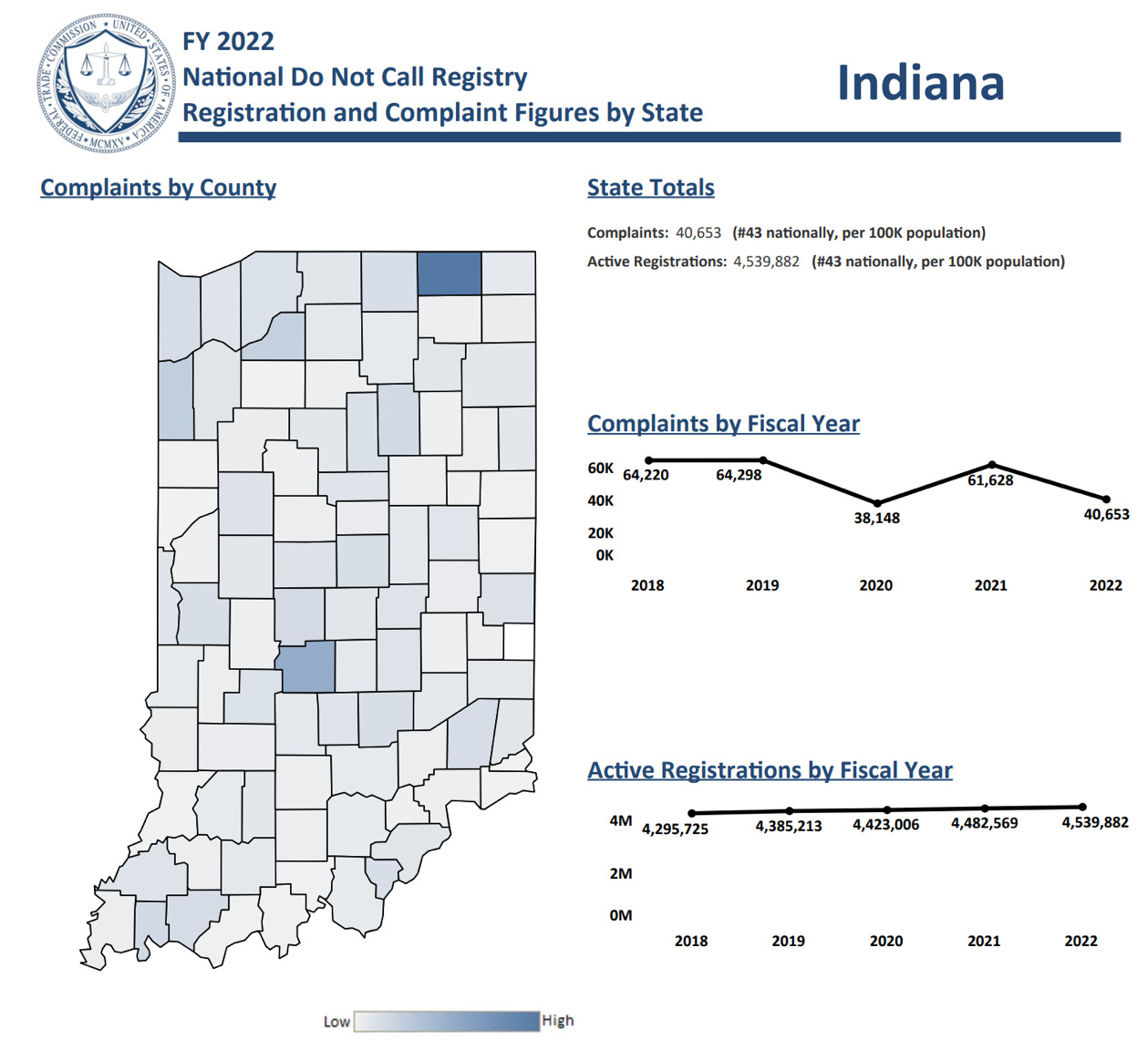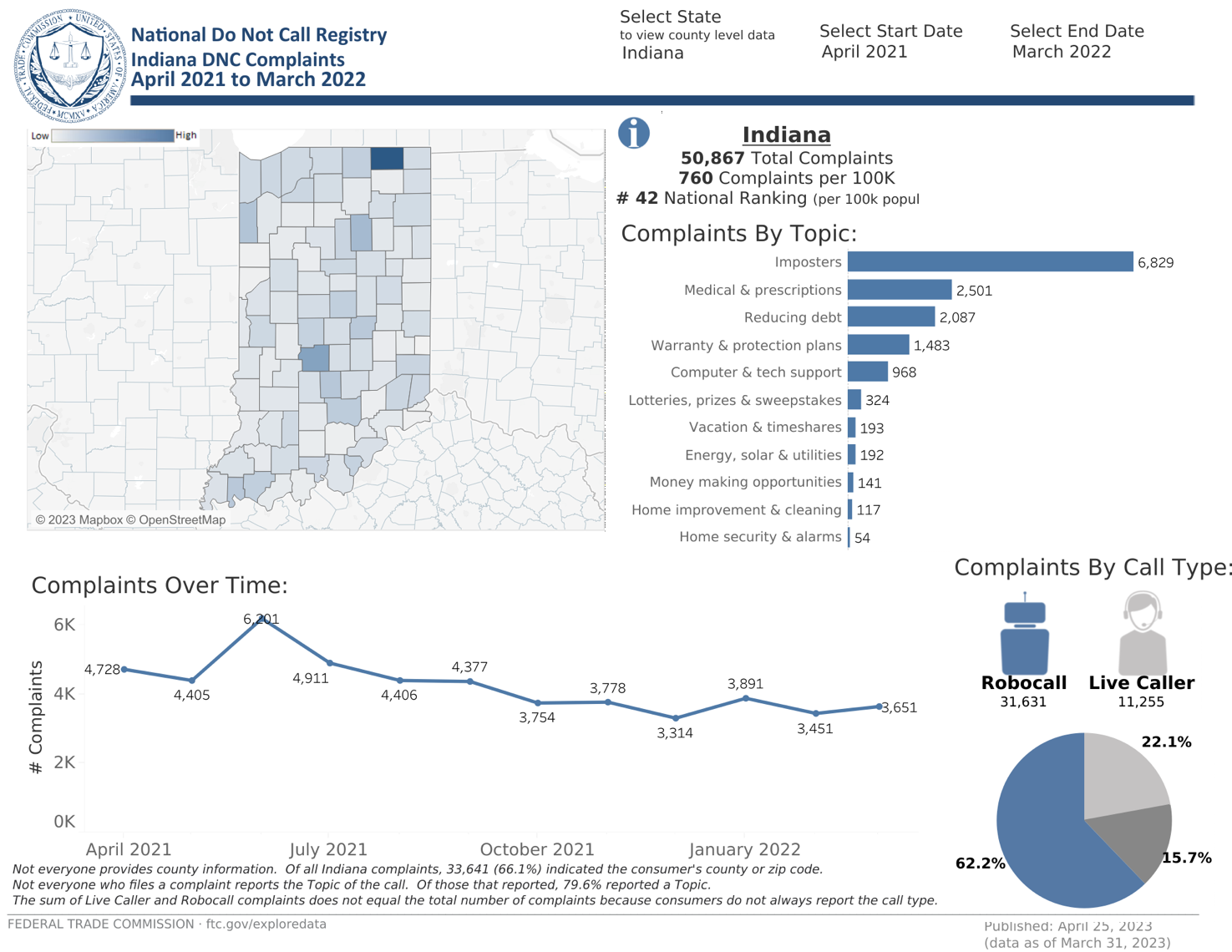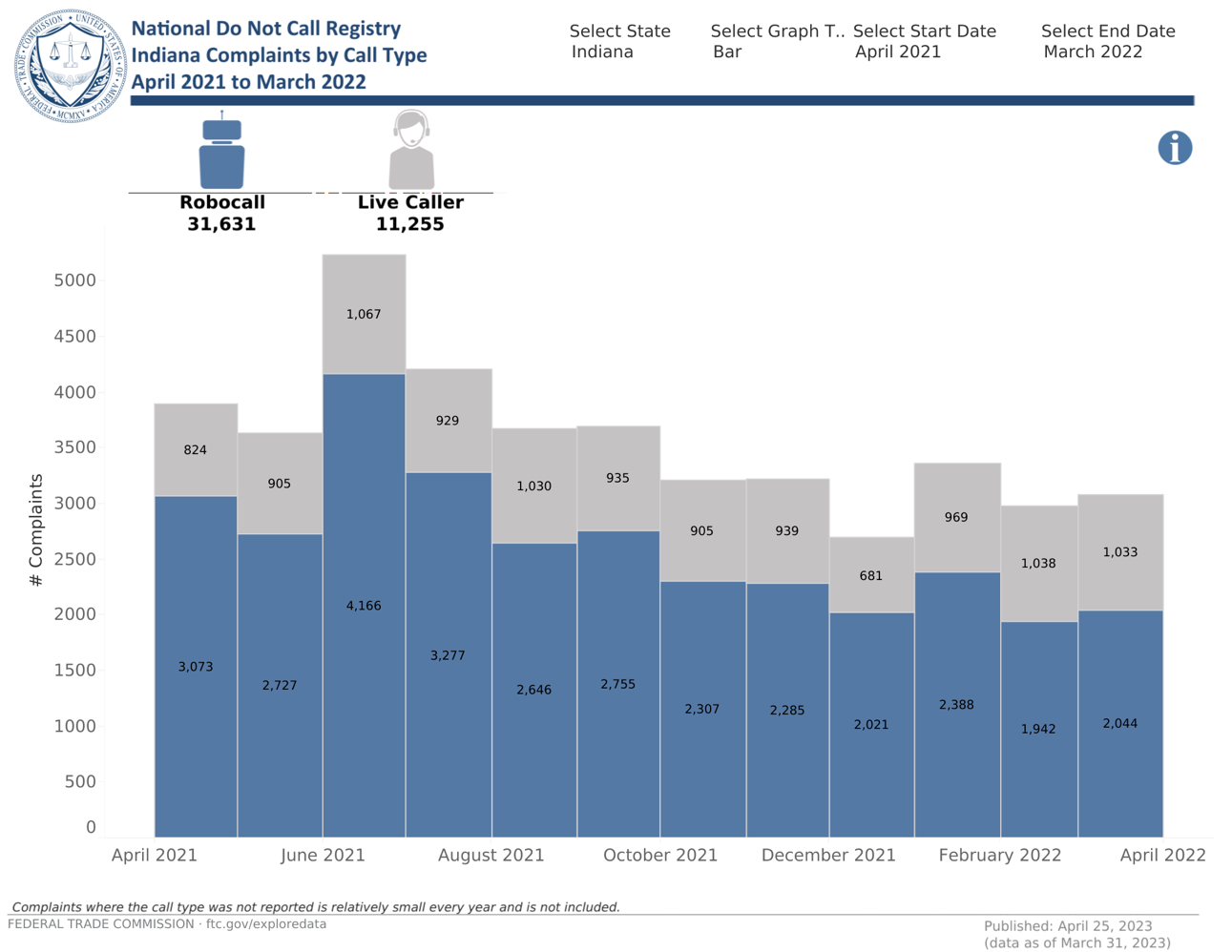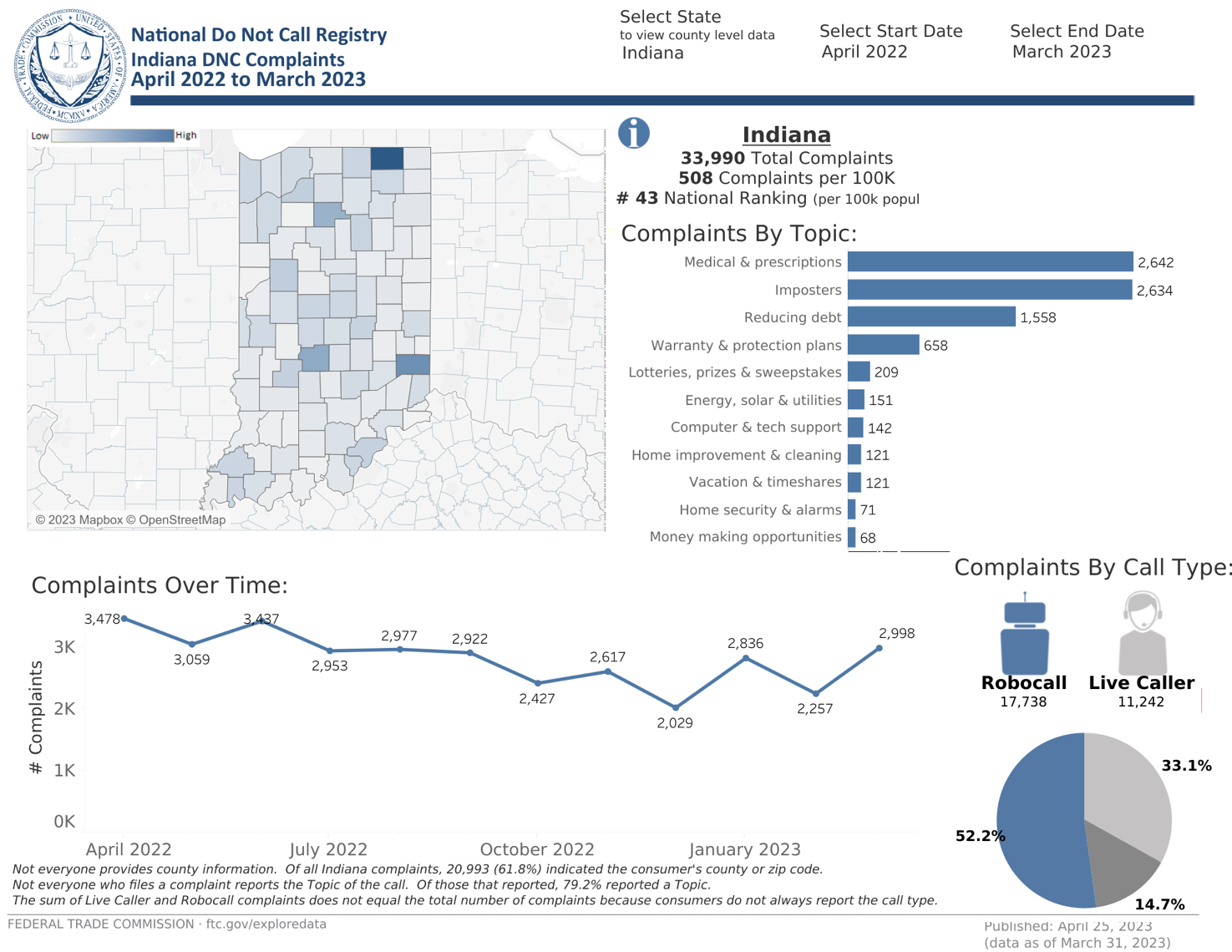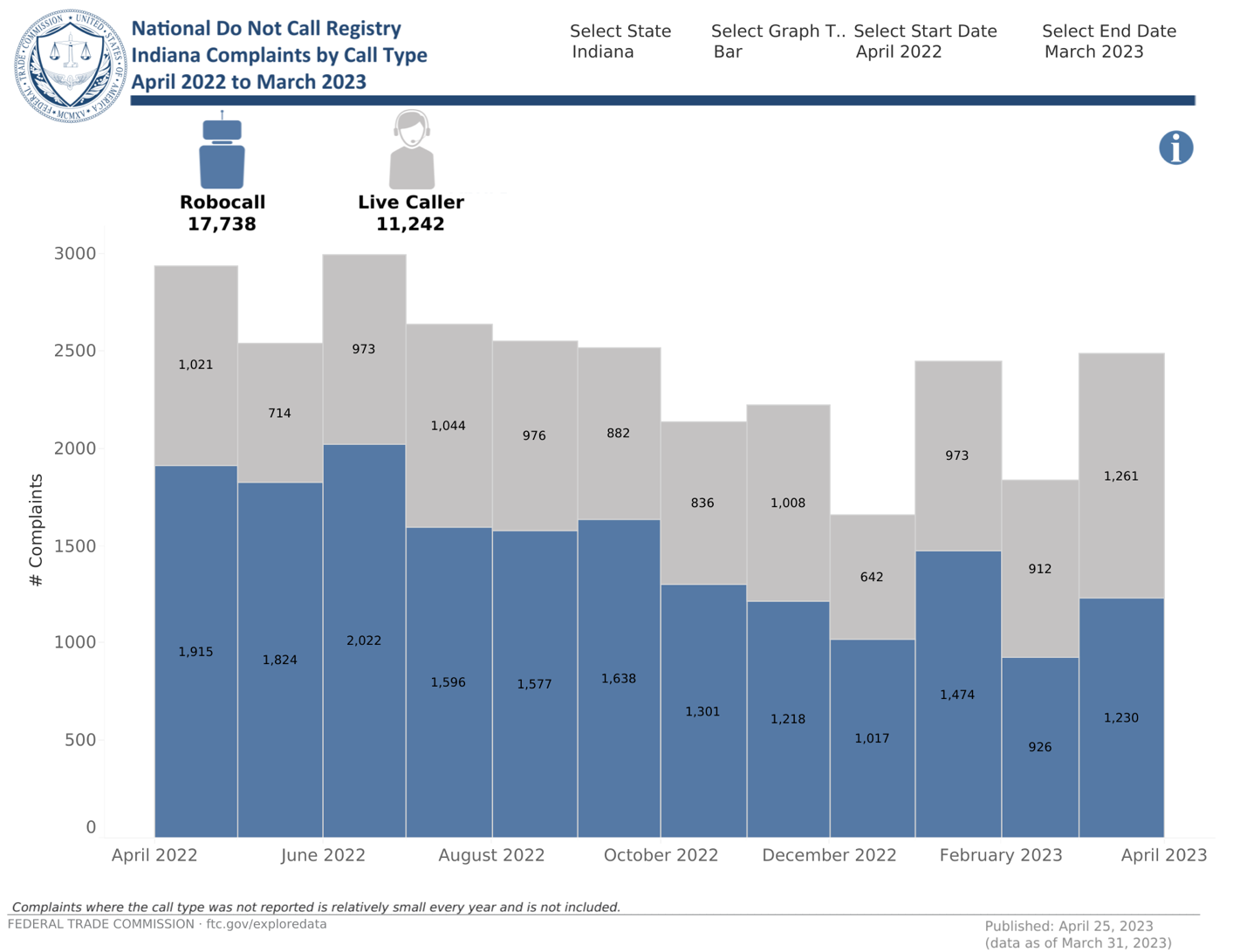Report Do Not Call Complaints




Report Do Not Call Complaints







Indiana ‘Do Not Call’ List
INDIANA ‘Do Not Call’ List
Useful Links:
About IN State DNC Law – https://www.indonotcall.org/
https://www.in.gov/attorneygeneral/consumer-protection-division/id-theft-prevention/do-not-call/
IN DNC Faqs – https://www.in.gov/attorneygeneral/consumer-protection-division/id-theft-prevention/do-not-call/faqs/
Register on IN DNC List – https://www.indonotcall.org/registrations/new
Verify number on IN DNC list – https://www.indonotcall.org/phone_numbers
————–
Telemarketing Laws in Indiana
Indiana imposes strict regulations upon telemarketing within the state. The Telephone Solicitation of Consumers Act, Ind. Code 24-4.7 (“Do Not Call law”) and the Regulation of Automated Dialing Machines Act, Ind. Code 24-5-14 (“Auto Dialer law”) provide additional protection to Indiana residents on top of the federal Telephone Consumer Protection Act (TCPA).
Indiana Attorney General’s office maintains a state Do Not Call List
The Consumer Protection Division of the Indiana Attorney General’s office is committed to safeguarding consumers against unwelcome telemarketing calls. The Indiana Attorney General maintains a state Do Not Call list for Indiana phone numbers. Indian consumers may add their phone numbers to the State Do Not Call list in addition to the National Do Not Call list.
Indiana residents may register any telephone number linked to your residential address, including residential (home), wireless, or VOIP numbers. Additionally, you can register prepaid wireless numbers primarily utilized in Indiana. This broad scope allows individuals to include various types of residential phone numbers in the Indiana Do Not Call list. This list is also referred to as the Indiana Telephone Privacy List.
How can an Indiana consumer register their phone number on the state Do Not Call List?
Registering your phone number to the state Do Not Call list is an easy process and can be done in any one of several ways.
- You can call 1.888.834.9969 from the phone that you wish to add to the Indiana Do Not Call list.
- You may complete the registration process by filling out a form online. You can add multiple phone numbers at once through this form.
- You can use the same form to update your new address for your previously registered phone numbers.
To Register on the Indian Do Not Call List online:
- Click on this link to register your phone number on the Indiana Do Not Call list: https://www.indonotcall.org/registrations/new
- Fill out your residential, VoIP, or cell phone number in the first page of the form.
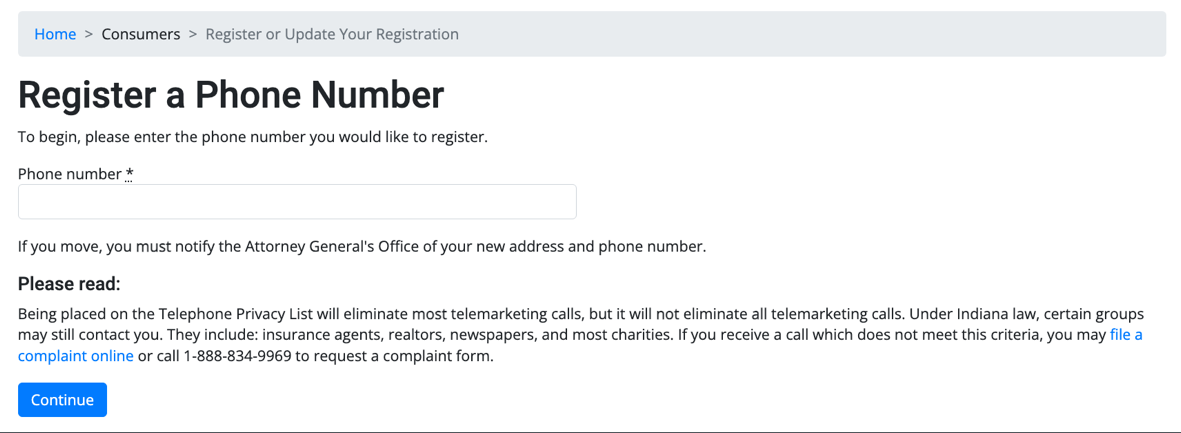
- On the next page of the form, you need to fill out your details including name, email, address, and all phone numbers you wish to add to the Indiana Do Not Call list.
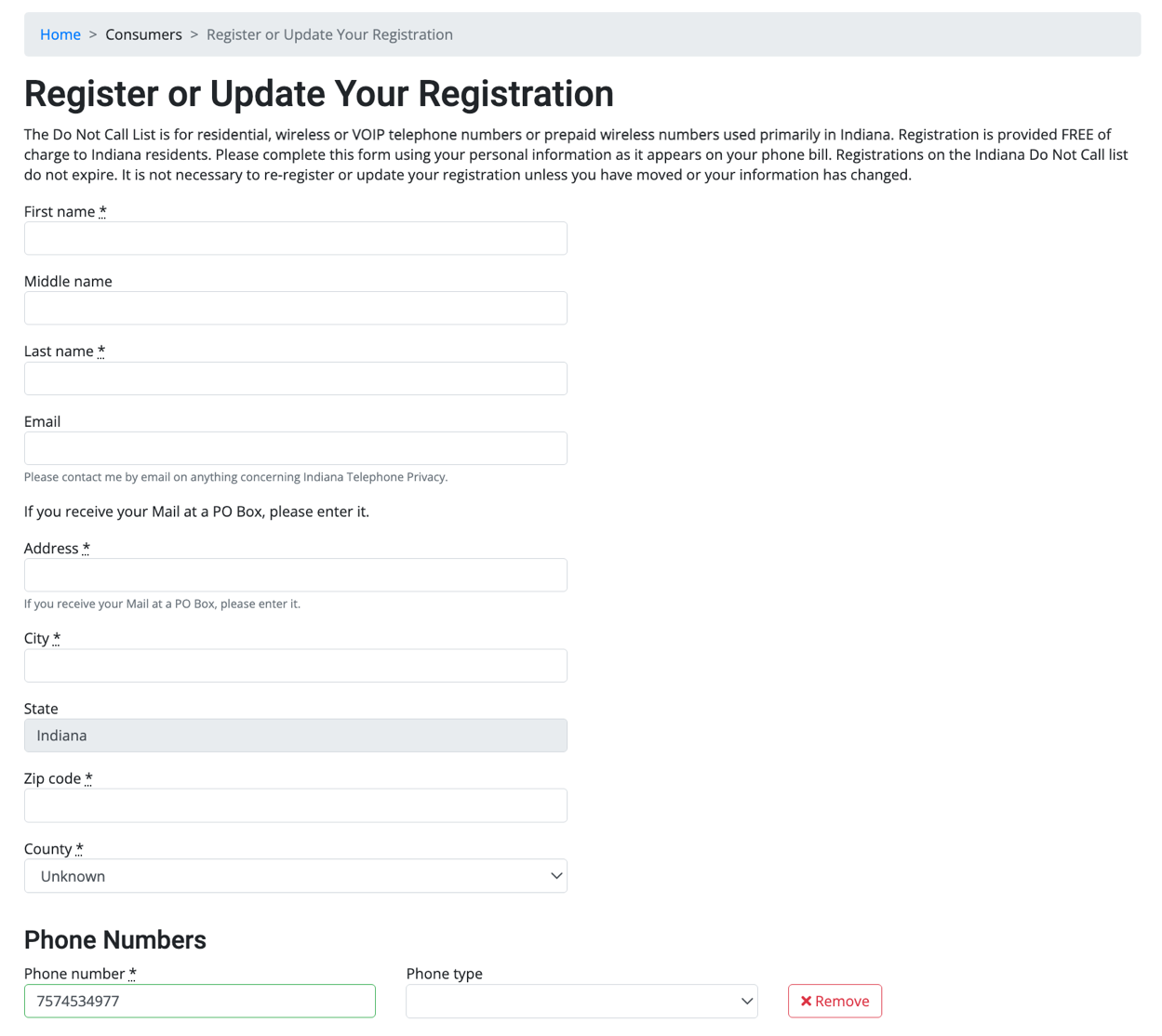
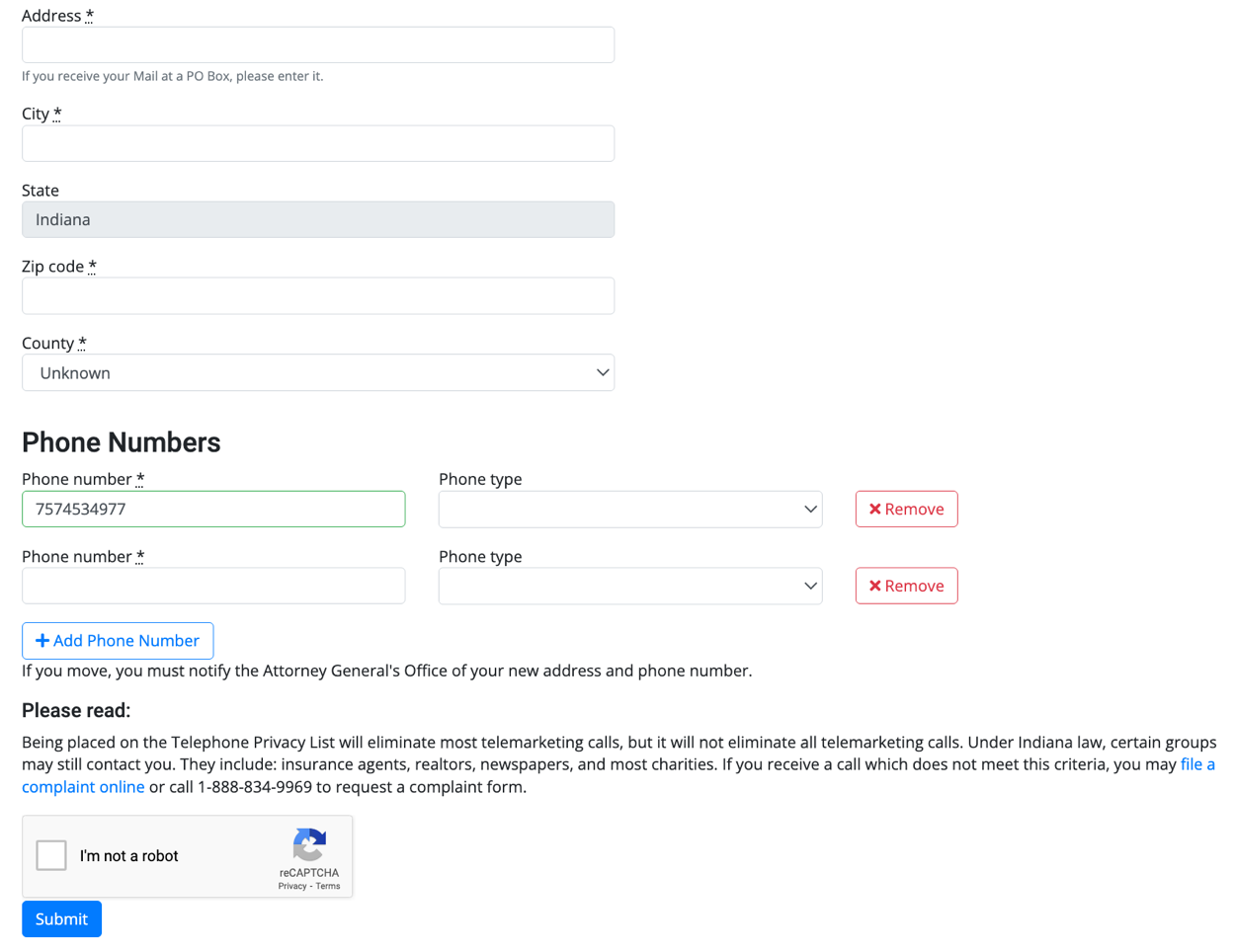
Once you add your phone number to the Indiana Do Not Call list, it stays on the list until:
- You remove your number from the list yourself.
- You terminate your subscription to that phone number, and it is reassigned to someone else.
- You change your address and have not updated your new address with the Indiana Do Not Call registry.
What happens once your phone number is added to the Indiana Do Not Call list?
The majority of telemarketers are prohibited from contacting or sending text messages to numbers listed on the Do Not Call registry. However, there are certain types of telephone solicitors who are exempt from this law and may still reach out to you. These exemptions include:
- charitable organizations,
- newspapers, and
- individual licensed insurance and real estate agents.
On July 1, 2019, the Indiana legislature expanded the scope of these exemptions. Since then, certain other entities are allowed to make calls to phone numbers listed on the Indiana Do Not Call list, including:
- Financial institutions, individuals licensed by the Department of Financial Institutions under IC 24-4.4, IC 24-4.5, or 750 IAC 9,
- Communications service providers offering broadband internet service.
However, these entities are permitted to make sales calls to you only when they have an existing business relationship with you.
As per this law, you have an existing business relationship with a business if:
- You concluded a transaction with that business within the past 18 months; OR
- You made an inquiry to that business within the past 3 months.
If an entity has an existing business relationship with a consumer, it is not prohibited from calling that consumer by the Indiana law or the federal law, TCPA.
Indiana Telemarketing Laws also restrict Robocalls.
Advancements in technology have facilitated the use of automatic dialing systems for telemarketers, enabling them to deliver pre-recorded sales messages, commonly known as robocalls. However the rampant misuse of robocalling has become a huge nuisance for millions of Americans.
The federal law, TCPA, prohibits the use of automatic dialing equipment to call cell phone numbers without prior consent. This safeguard ensures that individuals’ cell phones are protected from unwanted robocalls.
Robocalling is even more strictly prohibited under the Indiana state laws. According to state regulations, telemarketers calling Indiana consumers must have a live phone operator obtain consent before playing a pre-recorded message to the recipient. Robocalls without a live caller are prohibited regardless of whether they are solicitations or not.
There are only a few exceptions to the Robocalling restrictions in Indiana. For instance, school districts are permitted to make calls to students, parents, or employees for educational purposes, and businesses are allowed to contact employees to provide work schedule information. Furthermore, any entity that has obtained prior consent from a consumer to make pre-recorded calls to their phone numbers is allowed to engage in robocalls specifically to that particular consumer.
If you receive a call that you suspect to be a robocall, regardless of whether your number is on the Do Not Call list, you may report it by filing a complaint with the Attorney General’s Office. This allows authorities to investigate and take appropriate action against violators. Or you may consult a consumer rights attorney to investigate and help you secure the best legal remedy. TCPA allows consumers to recover $500 to $1500 for each call in violation of the law.
Does the Indiana law permit leaving pre-recorded voice message in my voicemail?
The answer to this actually depends on what your answering machine or voicemail prompt specifically says. If your voicemail or answering machine prompt:
- specifically asks callers to leave only their name and phone number of the person calling, then a caller does not have your permission to send a pre-recorded message to your voicemail or answering machine.
- invites a message to be left, then you give your permission to a live caller to send a pre-recorded voice message to your voicemail or answering machine.
Indiana’s Attorney General takes action against violating telemarketers.
Even though Indiana laws impose stricter restrictions upon telemarketing in the state than the federal law, it fails to provide a private right of action to consumers to take action against the violators individually or as a group of citizens. Consumers have to report calls to the state Attorney General’s office, and the AG investigates and takes legal action against the violator.
In contract, the TCPA allows both the remedies. Consumers may report calls to the FTC, or they may sue the violators individually to recover statutory damages for themselves, or even for a class of citizens who was similarly harassed by the same violator. This serves as a strong tool to force telemarketing companies to stay in line, and keep their cold calling activities in check.
The TCPA Protects American From Unwanted Telemarketing Calls.
The TCPA (Telephone Consumer Protection Act) is a federal law in the United States that safeguards consumer privacy by offering protection against unsolicited telemarketing calls. The TCPA provides several measures to ensure consumer privacy:
1. Prohibition of Automated Calls: The TCPA makes it illegal for telemarketers to use automated or prerecorded voice messages, commonly known as robocalls, to contact consumers without their prior consent. This restriction applies to both residential landline phones and cell phones, with stricter regulations for cell phones.
2. National Do Not Call Registry: The TCPA established the National Do Not Call Registry, which allows consumers to add their phone numbers to opt out of receiving telemarketing calls. Telemarketers are generally not allowed to call phone numbers listed on the Do Not Call Registry, unless the consumer has explicitly consented or specific exemptions apply.
3. Consent Requirements: Telemarketers must obtain the consumer’s express consent before making automated calls or sending prerecorded messages to their cell phones for marketing purposes. Consent can be given orally or in writing, but written consent is usually required for certain types of calls, such as those using an artificial or prerecorded voice.
4. Caller Identification: The TCPA mandates that telemarketers must display accurate caller identification information, including the name and phone number of the company or individual making the call. It is illegal to intentionally falsify caller ID information to deceive or mislead recipients.
5. Opt-Out Mechanism: Telemarketers are obligated to provide consumers with an easy and immediate way to opt out of receiving future telemarketing calls. Typically, this involves offering an automated opt-out mechanism during the call, such as pressing a specific button or stating a particular phrase.
6. Enforcement and Remedies: The TCPA grants consumers the right to take legal action against telemarketers who violate its provisions. Consumers can file private lawsuits to seek damages for actual losses or receive compensation of up to $500 per violation (which can increase to $1,500 per willful violation). Additionally, government agencies like the Federal Communications Commission (FCC) have the authority to enforce TCPA regulations and impose penalties on violators.
To fully utilize the protections provided by the TCPA, it is crucial for consumers to be aware of their rights and promptly report any violations to the appropriate authorities. Keeping a record of telemarketing calls or text messages that violate the TCPA can also be beneficial as evidence in legal proceedings. It is recommended to maintain comprehensive documentation, including important details such as the date, time, nature of the call, caller’s identity, and phone number, to build a strong case against TCPA violators.
Register your phone number on the National Do Not Call List today.
You can register your phone number on the National Do Not Call List, maintained by the Federal Trade Commission (FTC), very easily and without any charge. National Do Not Call list is a free service for the consumers. There is no fee or charge for registering a phone number on the DNC or for verifying your registration.
- To register your phone number on the National Do Not Call registry, you can just call this toll-free number: 1-888-382-1222.
- You may register by filling out this form on the National DNC website:
https://www.donotcall.gov/register.html#step1- You can register up to 3 phone numbers at once.
- You need to provide confirmation via email for completing the registration.
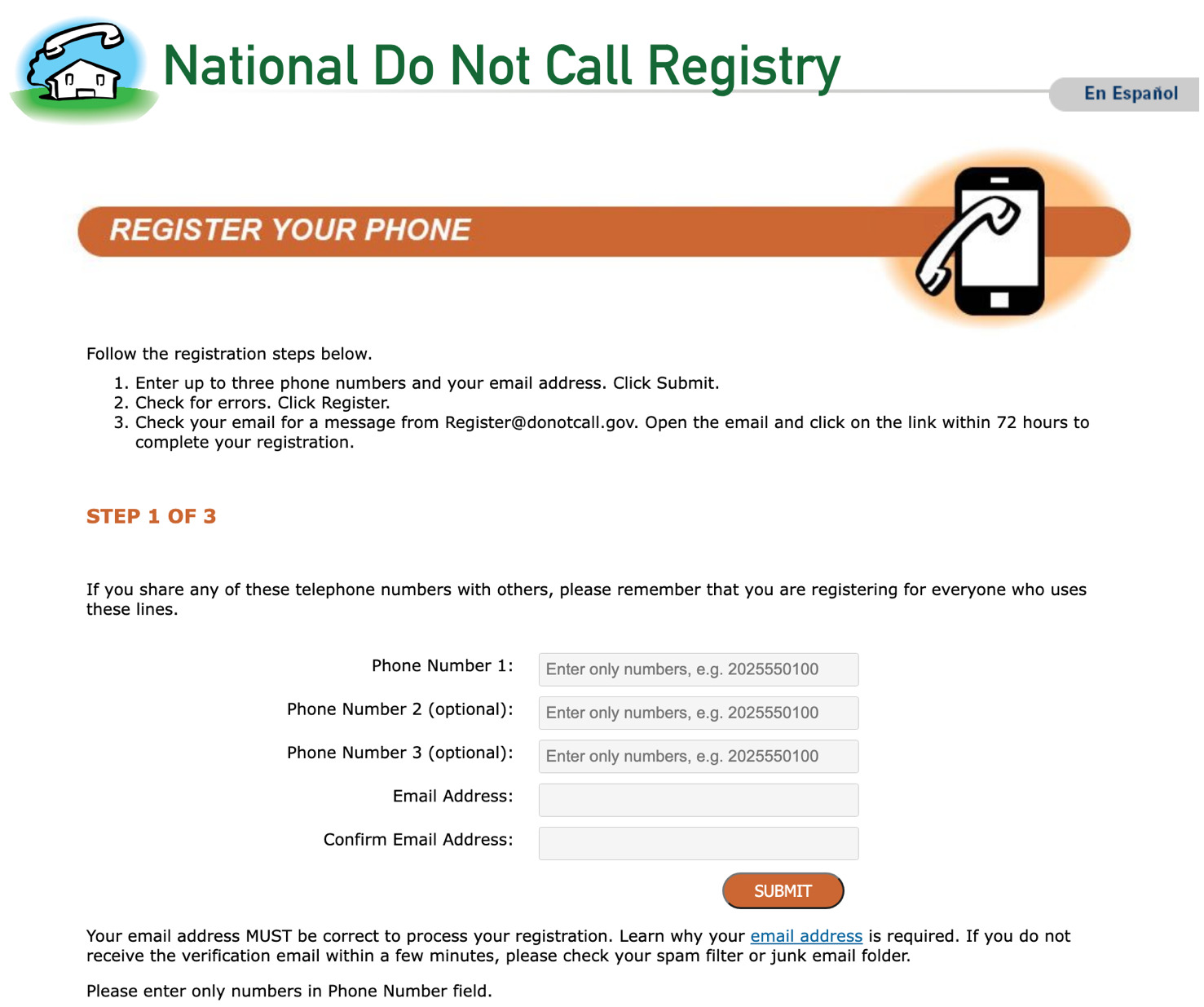
Your phone number should be added to the National Do Not Call list within a day after you complete the above registration process. Telemarketers have up to 30 days to take notice of your phone number from the day when it appears on the DNC list. Hence, typically, you should not be getting any more telemarketing calls after 31 days of registering on the DNC.
However if you still receive unwanted calls after a month of registering your phone number on the National DNC, then you should note all details about such calls and report it to the authority. You may either consider reporting to a government agency, FTC, FCC or your state’s AG. Alternatively, you may consult a consumer rights attorney to investigate the calls and evaluate the best remedy available to you under the state and federal laws.
Do you need to re-register a phone number on the National Do Not Call List after a few months or years?
No, you don’t. A phone number, once added to the National DNC, stays on the list unless:
- you disconnect the subscription to your phone number, or
- if your phone number is reassigned to a new consumer, or
- you voluntarily remove your phone number from the list.
Even if you registered your phone number on the DNC ages ago, it should still be on it. You can visit this link to verify your DNC registration to be sure: https://www.donotcall.gov/verify.html
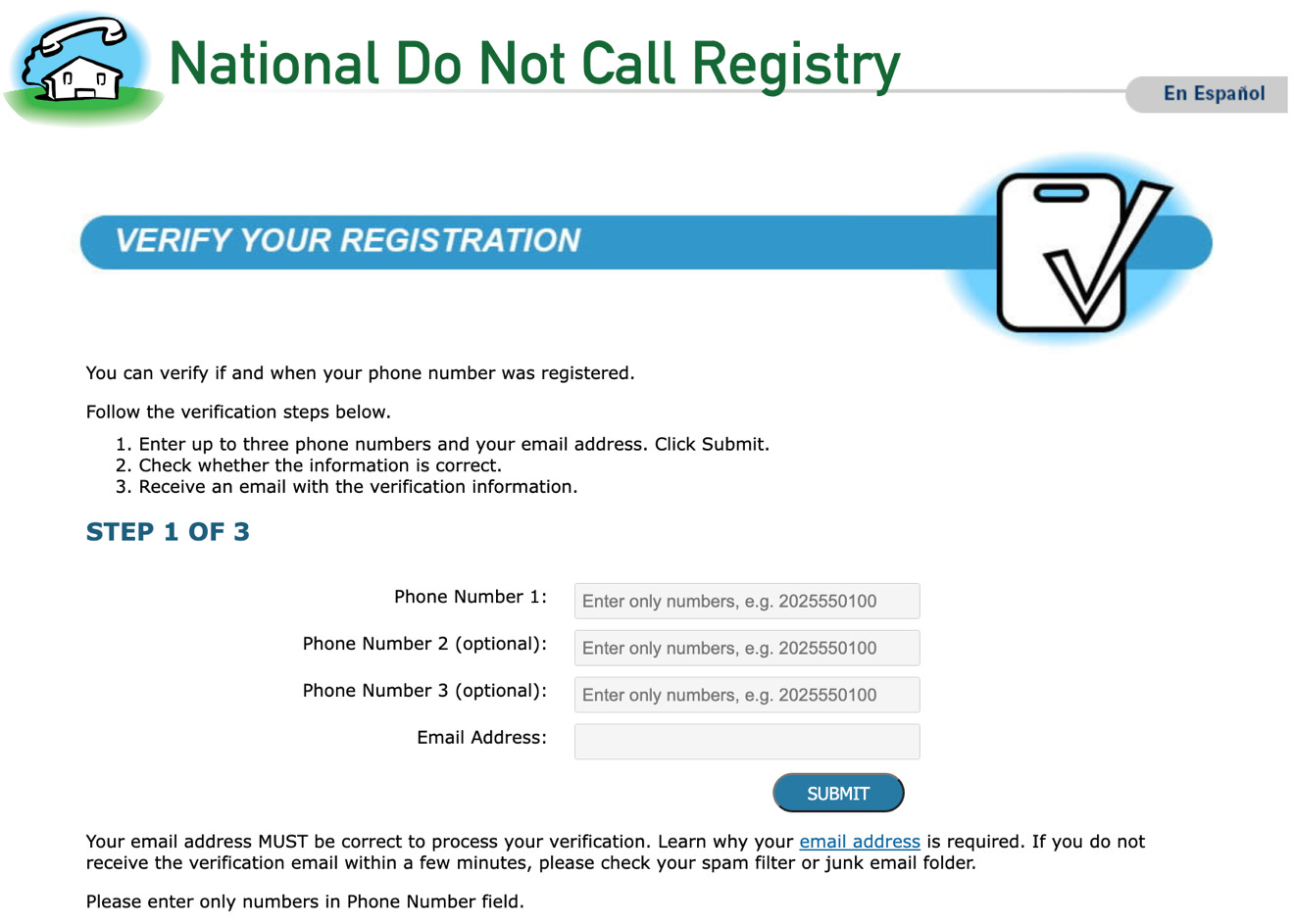
Would all telemarketing calls to my phone stop once I register on the DNC?
No, not all of them.
Although registering on the National Do Not Call list is a helpful step to reduce unwanted telemarketing calls, it’s essential to understand that it may not eliminate all calls entirely. Certain organizations, such as political organizations and charities, are exempt from the Do Not Call rules. While the Do Not Call list provides significant protection, being aware of these exemptions and factors can help manage expectations when it comes to telemarketing calls.
The Do Not Call Registry serves as a means to reduce unwanted telemarketing calls and text messages. However, certain types of calls are exempt from the Do Not Call restrictions. Here are the exceptions to the Do Not Call rules:
1. Calls to their existing customers: Telemarketing calls from businesses with whom you have an existing relationship, such as your bank or phone company, are permitted to call. They can also make a call or send a text to follow up on a previous transaction or to assess your satisfaction. However, calls with the intention of enticing you to make a new purchase are restricted.
2. Calls or texts made with your permission: If you have explicitly given written or verbal consent or have requested contact from a specific business, calls or texts in response to your request or permission are allowed. This can happen when you fill out forms on websites or interact with certain ads, so it’s important to exercise caution when providing your information online.
3. Calls or texts related to non-profit organizations: Messages promoting donations of property, goods, or services to non-profit organizations are permitted.
4. Calls or texts for non-commercial purposes: Calls or texts for polls, surveys, and political purposes are exempt from the Do Not Call rules. However, other TCPA restrictions may still apply to such calls.
5. Calls or texts to business telephone numbers: The National Do Not Call registry does not allow registration of telephone numbers used for business. Hence calling a business phone number is not prohibited as such. However, these calls are subject to certain other restrictions, like a telemarketer must stop calling a business phone number if the subscriber requests not to be called again.
6. Calls or texts made by individuals on their own behalf: Calls or texts made by individuals acting on their own behalf and not as employees or agents for others are not covered by the Do Not Call rules.
7. Calls or texts made by collection agencies: Collection agencies are permitted to make calls or send texts in their collection efforts.
An Overview of Complaints Indiana Residents made to FTC.
FTC’s annual report for FY 2022 states:
- With 4.5 million phone numbers from Indiana on the National Do Not Call list, Indiana is among the last 10 states with the minimum number of active DNC registrations for every 100,000 of its population. Only 67% of Indiana consumers are estimated to be on the National DNC list.
- The number of complaints FTC received from Indiana residents went down from 64,220 in 2018 to 40,653 in 2022. Making Indiana the 43rd state in terms of reporting telemarketing calls to the FTC.
- Even though Indiana residents have not been reporting calls to the FTC, it is possible that many may be reporting unwanted calls to the state Attorney General, or pursuing private actions against the violators.
- Between April 2021 and March 2022, the Federal Trade Commission (FTC) received a total of 50,867 complaints from Indiana residents regarding unwanted calls. On average, this amounted to 760 complaints filed for every 100,000 individuals in the state’s population.
- Indiana residents file around 3,000 to 6,000 complaints about unwanted calls to the FTC each month.
- More than 60% of the complaints are for robocalls, 22% for live callers. While more than 15% of the complaints do not specify the type of call.
- The chart provided below depicts the monthly reported numbers of robocalls and live calls recorded between April 2021 and March 2022 for Indiana.
- The number of complaints Indiana residents made to the FTC declined further the following year to approximately 34,000 complaints between April 2022 to March 2023. Just 508 complaints for every 100,000 of Indiana’s population.
- Compared to the preceding year, the proportion of reported live calls went up from 22% to 33%, while reported robocalls went down from 62% to 52%.
- The majority of complaints filed by Indiana residents with the FTC were related to calls from imposters, telemarketing calls offering warranty and protection plans, calls regarding medical and prescription matters, and calls promoting debt reduction offers.
- The following chart displays a monthly breakdown of complaints made by Indiana residents to the FTC from April 2022 to March 2023. Indiana residents reported 17,738 robocalls and 11,242 calls made by live callers during this year.
If you are receiving annoying telemarketing calls, and suspect they may be in violation of the law, these are some options you could choose from:
1. Seek Legal Counsel: It is advisable to seek advice from an attorney who specializes in consumer protection laws. They can assess your situation, determine if a violation has occurred, and provide guidance throughout the legal process. An attorney can assist you in pursuing compensation or appropriate remedies for each call or text message that violates the TCPA. In some cases, you may be entitled to damages ranging from $500 to $1,500 per violation. If other consumers have experienced similar calls, you might even have the option to file a class action complaint on their behalf too.
2. Submit a Complaint to the FCC: The Federal Communications Commission (FCC) is the governing body that enforces the TCPA. You have the option to file a complaint through the FCC’s Consumer Complaint Center, which can be accessed online at https://consumercomplaints.fcc.gov/. Alternatively, you can reach out to the FCC via phone or mail. It is important to provide comprehensive details about the violations, including specific dates, times, caller details, and any additional evidence you may possess.
3. Submit a Complaint to the FTC: The Federal Trade Commission (FTC) is another authority involved in enforcing the TCPA. To file a complaint, you can use the FTC’s Complaint Assistant available at https://www.ftccomplaintassistant.gov/. It is crucial to provide comprehensive details about the violations, along with any supporting evidence you have collected, to strengthen your complaint.
By taking these steps, you can help raise awareness of TCPA violations, contribute to the enforcement of regulations, and ensure telemarketers are held accountable for their actions. It is important to maintain detailed records of pertinent information such as dates, times, caller information, screenshots of call logs, and any communication records. These records can serve as valuable evidence to support your complaint and strengthen your case.
Conclusion:
Indiana residents have the option to utilize the provisions of the TCPA (Telephone Consumer Protection Act) to address unwanted telemarketing calls and potentially seek compensation. However, understanding the complexities of the law and its practical implications can be challenging. It is advisable to consult with a legal expert to gain a comprehensive understanding of your rights and determine the appropriate actions to take. They can provide personalized guidance based on your specific circumstances, empowering you to effectively address privacy violations stemming from unwanted telemarketing calls.
It is important to note that while the TCPA establishes statutory damages for each violation, the actual recovery of these damages is not guaranteed. The ability to collect statutory damages largely depends on the financial situation of the violator and their capacity to satisfy the judgment. Nevertheless, the TCPA provides consumers with significant remedies to combat unwanted calls and establishes a legal framework for addressing privacy infringements. While the final collection of damages may vary for each case, the TCPA remains a powerful tool in holding telemarketers accountable and safeguarding consumer rights in relation to unwanted calls.
-
https://www.ftc.gov/system/files/ftc_gov/pdf/DNC-Data-Book-2022.pdf ↑
-
https://public.tableau.com/app/profile/federal.trade.commission/viz/DoNotCallComplaints/Maps ↑
-
https://www.ftc.gov/system/files/ftc_gov/pdf/DNC-Data-Book-2022.pdf ↑
-
https://public.tableau.com/app/profile/federal.trade.commission/viz/DoNotCallComplaints/Maps ↑
-
https://www.ftc.gov/system/files/ftc_gov/pdf/DNC-Data-Book-2022.pdf ↑
